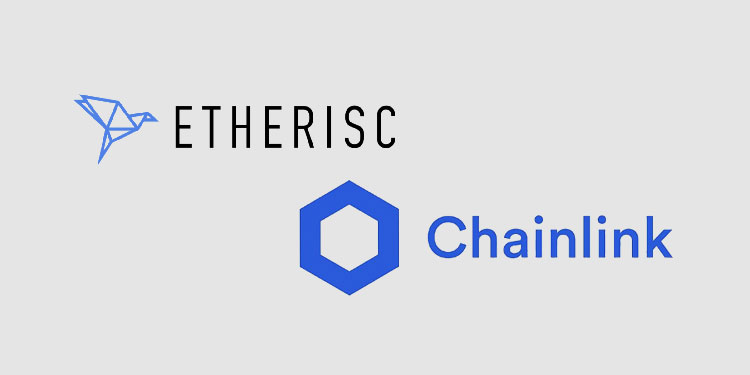Etherisc, a decentralized insurance protocol, announced today that it has now launched a working decentralized flight insurance Proof Of Concept on Rinkeby, an Ethereum testnet. The demo incorporates reliable data feeds delivered by Chainlink.
By combining the decentralized security of Ethereum with the decentralized oracle framework of Chainlink, users have access to a trust minimized insurance product that is secure end-to-end.
“To understand the significance of this achievement, we outline the current limitations of flight insurance, how smart contracts can open up new value in the industry, and why decentralized data sourcing via Chainlink is key to developing a more secure and exceedingly functional solution…”
– The Etherisc Team
Current Flight Insurance Models
In the current model, users must manually file claims, which are then processed internally by the insurance company to verify whether or not the claim is entitled to compensation in accordance with their specific policy.
An obvious issue that arises is the potential for disagreements between the two parties regarding the payout decision. Ultimately, the insurance provider is solely responsible for arbitrating claims, which leads to certain unavoidable information asymmetry. While most claims are settled fairly, the lack of transparency around claims processing harnesses natural mistrust given the imbalances between the two sides when it comes to access to information and control over the process.
The other inefficiencies involve manual claims processing, which adds additional overhead and extends settlement periods. When companies process claims internally, they have to pay for employee labor and/or server and software maintenance. These costs get passed on to the consumer as higher policy premiums and longer wait times. While this has been sufficient in incubating the flight insurance industry, what if there was a way to automate claims to benefit both sides of this business process?
Decentralized Insurance Using Chainlink Powered by Smart Contracts
Blockchains can act as reliable and immutable engines for processing insurance claims thanks to their decentralized security. Smart contracts running on blockchains allow for the terms of an insurance agreement to be transformed into digital logic that executes based on predefined conditions, which neither party can tamper with. In the case of flight insurance, insurance policies can be programmed to process claims and make payouts once certain data is received, i.e. data about the flight’s status.
Once the underlying contract logic is written, the first hurdle is getting the blockchain access to quality data about a flight’s status. There are good sources on the market for flight data, such as web APIs like flightstats.com. However, smart contracts cannot interact with data outside the native blockchains (off-chain) they run on. This means the smart contract cannot connect directly to these trusted data sources to trigger the contract.
The other concern for parametric insurance contracts is the reliability of the data delivery mechanism. If users are going to trust these decentralized insurance policies over traditional insurance then they must be confident in both the logic of the smart contract and the method of obtaining data. There is no point in having a fully decentralized blockchain for processing the contract logic if the method of data delivery is completely centralized.
An oracle is a digital agent employed by a smart contract to connect it with off-chain data. Oracles enable this off-chain connectivity for the smart contract by pulling in data from external connection points, so-called Application Programming Interfaces (APIs)
Chainlink + Etherisc
Chainlink is a decentralized oracle network that gives smart contracts secure and reliable access to data providers, web APIs, enterprise systems, cloud providers, IoT devices, payment systems, other blockchains and much more. It also allows users to customize how their contract communicates with anything off-chain using varying levels of decentralization.
Thus, Chainlink node operators act as independent, Sybil resistant oracles that fetch data from a trusted web API for flight status data. In our POC, multiple Chainlink oracles retrieve data about whether or not the flight was delayed using an external adapter for the Flightstats API.
The individual node responses can then be aggregated together into a single data point. This allows for the decentralization of data delivery, which protects against oracle downtime and a single oracle being a point of failure.
In the future, Etherisc aims to make it even more decentralized by increasing the number of Chainlink node operators retrieving data, as well as the number of data providers available from which to pull data. Finding original sources of data for flights is an ongoing industry challenge and something the Etherisc team is actively working to improve upon.
“We believe that as more parametric insurance models emerge, the incentive for additional data providers to enter the market increases. By further decentralizing both the data delivery and the data source, users gain even more security that the insurance product will execute in a reliable and trustworthy manner. Trust-minimized insurance products like flight insurance offer potential benefits for both policyholders and insurance providers. Anyone in the world can get access to a flight insurance policy that they know will execute exactly as written if certain conditions are met. Insurance companies stand to save money on the backend by cutting their overheard for processing claims, as well as improved brand recognition thanks to moving policy arbitration to a neutral third party protocol.”
– The Etherisc Team
